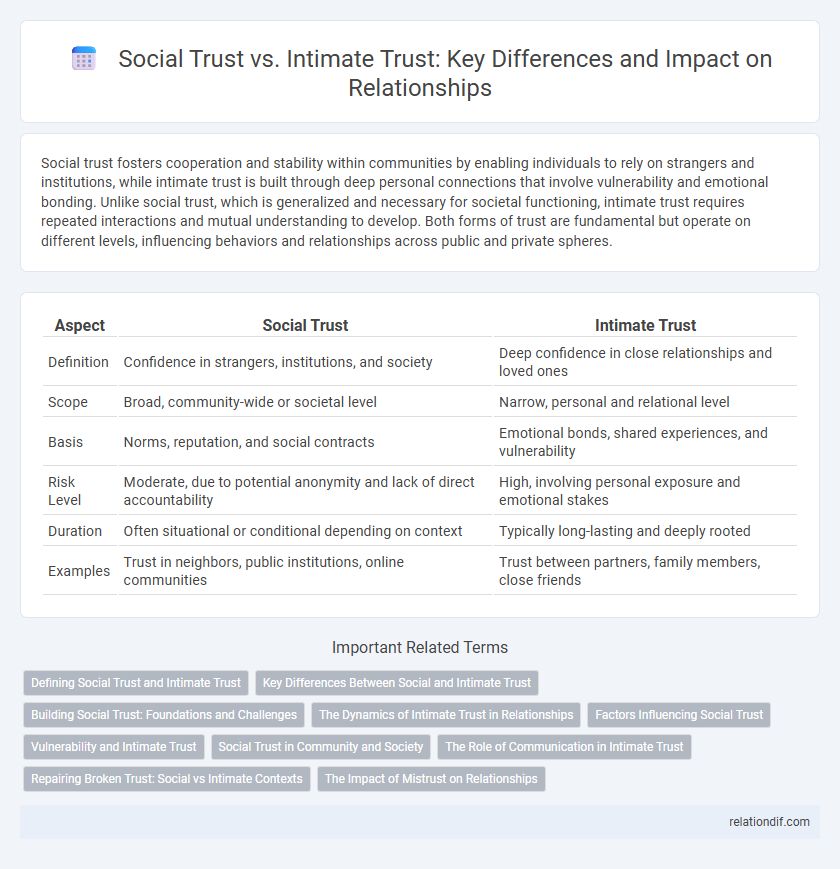Social trust fosters cooperation and stability within communities by enabling individuals to rely on strangers and institutions, while intimate trust is built through deep personal connections that involve vulnerability and emotional bonding. Unlike social trust, which is generalized and necessary for societal functioning, intimate trust requires repeated interactions and mutual understanding to develop. Both forms of trust are fundamental but operate on different levels, influencing behaviors and relationships across public and private spheres.
Table of Comparison
| Aspect | Social Trust | Intimate Trust |
|---|---|---|
| Definition | Confidence in strangers, institutions, and society | Deep confidence in close relationships and loved ones |
| Scope | Broad, community-wide or societal level | Narrow, personal and relational level |
| Basis | Norms, reputation, and social contracts | Emotional bonds, shared experiences, and vulnerability |
| Risk Level | Moderate, due to potential anonymity and lack of direct accountability | High, involving personal exposure and emotional stakes |
| Duration | Often situational or conditional depending on context | Typically long-lasting and deeply rooted |
| Examples | Trust in neighbors, public institutions, online communities | Trust between partners, family members, close friends |
Defining Social Trust and Intimate Trust
Social trust refers to the generalized belief in the reliability, integrity, and fairness of members within a community or society, enabling cooperation and collective action. Intimate trust, in contrast, is the deep confidence placed in close relationships such as family or partners, characterized by vulnerability and emotional bonding. Defining these types highlights social trust as foundational for societal cohesion, while intimate trust underpins personal security and emotional well-being.
Key Differences Between Social and Intimate Trust
Social trust primarily involves generalized confidence in others within a community or society, based on shared norms and reputations, whereas intimate trust centers on deep emotional bonds and personal vulnerability between close individuals. The scope of social trust is broader and less personalized, often influencing societal cohesion and cooperation, while intimate trust requires ongoing personal interactions and mutual understanding. Differences also manifest in risk levels; social trust accepts moderate unpredictability in social exchanges, whereas intimate trust demands higher reliability and emotional security.
Building Social Trust: Foundations and Challenges
Building social trust relies on shared norms, transparency, and consistent communication within communities and institutions, creating a foundation for collaboration and social cohesion. Challenges include overcoming misinformation, cultural differences, and historical grievances that can erode confidence in social structures. Effective leadership and inclusive policies are essential to foster resilience and restore trust in diverse social networks.
The Dynamics of Intimate Trust in Relationships
Intimate trust in relationships is built through consistent emotional vulnerability and mutual responsiveness, fostering a deep sense of security between partners. Unlike social trust, which hinges on generalized expectations within communities, intimate trust requires ongoing communication and the validation of personal boundaries. This dynamic process strengthens relational bonds by promoting empathy and resilience against conflicts.
Factors Influencing Social Trust
Social trust is primarily influenced by factors such as cultural norms, social capital, and institutional integrity, which foster a sense of community and collective reliability. Economic stability and transparent communication further enhance social trust by promoting predictability and fairness in societal interactions. Unlike intimate trust, which depends on personal intimacy and emotional bonds, social trust relies on generalized expectations of honesty and cooperation among strangers.
Vulnerability and Intimate Trust
Intimate trust requires a higher degree of vulnerability, allowing individuals to share personal thoughts and emotions without fear of judgment or betrayal. This deep level of trust fosters secure, meaningful connections that promote emotional safety and mutual understanding. Unlike social trust, which operates in broader, more impersonal interactions, intimate trust depends on consistent, empathetic responsiveness to vulnerability.
Social Trust in Community and Society
Social trust forms the foundation of cohesive communities by enabling cooperation, reducing transaction costs, and fostering collective action among diverse individuals. High levels of social trust correlate with increased civic participation, lower crime rates, and greater social capital, enhancing overall societal wellbeing. Unlike intimate trust, which is built through personal relationships, social trust extends to generalized confidence in institutions, strangers, and societal norms.
The Role of Communication in Intimate Trust
Effective communication significantly enhances intimate trust by fostering emotional openness and mutual understanding between partners. Nonverbal cues, active listening, and honest expression of feelings create a secure environment that strengthens relational bonds. Consistent, transparent dialogue reduces misunderstandings and builds a foundation of reliability essential for deep, intimate trust.
Repairing Broken Trust: Social vs Intimate Contexts
Repairing broken trust in social contexts often involves public accountability, transparent communication, and consistent behavior to rebuild credibility among broader networks. In intimate contexts, restoring trust requires deep emotional engagement, sincere apologies, and sustained efforts to address personal vulnerabilities and past betrayals. The complexity of intimate trust repair hinges on mutual empathy and the restoration of a secure emotional bond, whereas social trust repair leans more on observable actions and reputation management.
The Impact of Mistrust on Relationships
Mistrust in social settings often leads to weakened community bonds, decreased cooperation, and increased suspicion among individuals, undermining overall societal harmony. In intimate relationships, mistrust triggers emotional distance, heightened conflict, and erosion of vulnerability, which are critical for deep connection and support. The persistent presence of mistrust disrupts communication patterns and fosters insecurity, ultimately threatening the stability and longevity of both social and intimate relationships.
Social trust vs Intimate trust Infographic

 relationdif.com
relationdif.com